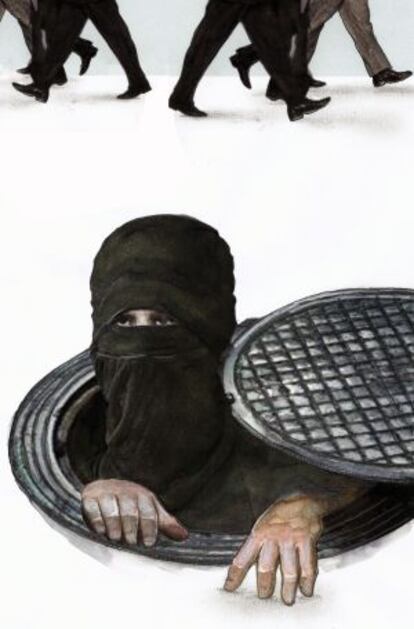Why did the Madrid train bombings divide, not unite Spaniards?
International terrorism and security expert Fernando Reinares analyzes the rift created in Spanish society by the March 11, 2004 attacks, and what it means today

Contrary to what happened in British society after the London attacks on July 7, 2005, the Madrid train bombings of March 11, 2004 profoundly divided Spanish society.
The after effects of that disunity persist, although they have become less manifest with time. The disunity was, and continues to be, based on differing attributions of blame for the commuter train massacre. Yet it proved to be a spurious division resulting from a politicization of 11-M, as the attacks came to be known.
This situation, in turn, was made possible by specific features of the Spanish political system ¨C such as its greater penchant for polarization, or the recurring absence of cross-party consensus on matters of defense, foreign affairs or counter-terrorism ¨C but above all because citizens were unaware of a terrorist threat that had been present in Spanish society for a full decade before 11-M.
Some Spaniards, particularly those whose political beliefs lie on the right of the spectrum, believed (and partly still do) that the Madrid attacks were somehow the work of Basque terrorist organization ETA. The most common version of this argument goes that the moritos de Lavapi¨¦s (or, the Little Moors from Lavapi¨¦s) ¨C an odd way to talk about the people who set up the 11-M terrorist network ¨C lacked the knowledge and ability to carry out the March 11, 2004 attacks.
That is why, even though these individuals took part in the events, they must have been induced and supported from within Spain by other, more experienced terrorists. Often, this argument is supplemented with speculation about the way Jos¨¦ Luis Rodr¨ªguez Zapatero ¨C the new Socialist prime minister who emerged out of general elections held three days after 11-M ¨C later offered ETA a transformative way out via an ultimately failed negotiation process instead of trying to defeat it.
There was a huge lack of awareness about the expansion of jihadism in our country since the mid-1990s
Other Spaniards, mostly those on the left of this political spectrum, believed (and more than a few still do) that the attacks of March 11, 2004 were a consequence of the ¡°Azores photograph,¡± a reference to a shot taken on March 16, 2003 on one of the Portuguese islands that illustrated the affinity between the Spanish prime minister at the time, Jos¨¦ Mar¨ªa Aznar of the center-right Popular Party (PP), and then-US President George W. Bush and his war on terror.
This affinity led to the subsequent deployment of Spanish troops in Iraq shortly after the US invaded the country and toppled its dictator Saddam Hussein. It has not been unusual for this sector of Spanish society to criticize the PP for its insistence on associating ETA with 11-M even after the evidence pointed elsewhere, in order to protect its voting expectations at an election that was held just three days after the bombings.
In truth, both interpretations of 11-M were erroneous, and the lacerating rift that divided Spaniards, including the surviving victims themselves, continues to be deceiving. There is no direct or indirect evidence that ETA was somehow involved in the bomb attacks. Nor is it true that the idea of perpetrating a massacre in Madrid originated in the presence of Spanish soldiers on Iraqi soil.
Like I explain and document in my book ?Matadlos! Qui¨¦n estuvo detr¨¢s del 11-M y por qu¨¦ se atent¨® en Espa?a (or, Kill them! Who was behind 11-M and why was Spain attacked?), the decision to carry out that act of terrorism was made in December 2001 in the Pakistani city of Karachi, and ratified at a meeting that delegates from three jihadist organizations from the Maghreb region held in Istanbul in February 2002. Besides that, what later became the 11-M network began forming the following month, over a year before the Iraq invasion took place.
Spain¡¯s political elites and civil society as a whole, especially the media, have a pending challenge
But it was not really necessary to investigate the 11-M attacks, or to unveil new information about them, to avoid this division between Spaniards ¨C even though doing so has helped narrow the gap. It would have been enough if, like the British, we Spaniards had been sufficiently aware of the threat of jihadist terrorism hovering over our heads since well before the invasion and occupation of Iraq. Since at least 1997, reports sent in by the Foreign Intelligence Central Unit (UCIE) of the National Police to investigating judges at the High Court ¨C in charge of authorizing wiretaps of jihadists active in Spain ¨C were warning about the need for investigations ¡°to prevent the highly probable perpetration of attacks in our country.¡±
During my book presentations throughout the past year in numerous Spanish cities, I was able to certify that, even among citizens with an interest in the issue who were adults when the Madrid bombings took place, there was a huge lack of awareness about the expansion of jihadism in our country since the mid-1990s. Practically nobody ¨C or at least very few people ¨C knew that back in 1994 Al Qaeda had founded in Spain one of its most important cells in all Western Europe, or that this cell was broken up in November 2001 after it was shown to have ties with the people who committed the 9/11 attacks on US soil.
Practically nobody was aware that throughout 2003, the year before 11-M, over 40 individuals were arrested in Spain for their involvement in jihadist terrorism activities. That figure had not been so high since the first jihadist arrest in Barcelona in 1995 and the first breakup of a jihadist cell in Valencia in 1997.
Spaniards sought to explain the bombings using familiar concepts: ETA and Iraq
This lack of awareness about these and many other incidents relating to the evolution of jihadist terrorism in Spain in the decade prior to the Madrid attacks, and the fact that this reality was not perceived as a threat by Spanish public opinion until very late, and then only after the Iraq crisis of 2002, can be partly explained by all the attention that ETA¡¯s frequent terrorist attacks were getting. But there was no adequate education by the political class regarding a problem that was even trivialized on occasion ¨C suffice it to mention the humorously titled Operation Dix¨¢n, named after a brand of detergent.
As a result, when 11-M occurred, Spaniards sought to explain the terrorist bombings using familiar concepts, since they could not do so using unfamiliar ones. What was familiar? On the one hand, ETA, and on the other, Iraq. If 11-M divided us, it is because we as a society lacked the necessary resilience against large-scale terrorist attacks beyond our immediate crisis and emergency management skills.
At present, with global jihadism more widespread than ever and the terrorist threat against liberal democracies at levels unseen since 9/11, Spain¡¯s political elites and civil society as a whole, especially the media, have a pending challenge: to make Spain less vulnerable, more aware and increasingly resilient to the penetration of jihadist actors and ideologies as well as to any future expressions of their violence against our own citizens and interests.
Fernando Reinares is a senior analyst on international terrorism at the Elcano Royal Institute think tank, a professor of political science at Rey Juan Carlos University and an adjunct professor of security studies at Georgetown University. He is the author of ?Matadlos! Qui¨¦n estuvo detr¨¢s del 11-M y por qu¨¦ se atent¨® en Espa?a (Galaxia Gutenberg / C¨ªrculo de Lectores, 2014).
Tu suscripci¨®n se est¨¢ usando en otro dispositivo
?Quieres a?adir otro usuario a tu suscripci¨®n?
Si contin¨²as leyendo en este dispositivo, no se podr¨¢ leer en el otro.
FlechaTu suscripci¨®n se est¨¢ usando en otro dispositivo y solo puedes acceder a EL PA?S desde un dispositivo a la vez.
Si quieres compartir tu cuenta, cambia tu suscripci¨®n a la modalidad Premium, as¨ª podr¨¢s a?adir otro usuario. Cada uno acceder¨¢ con su propia cuenta de email, lo que os permitir¨¢ personalizar vuestra experiencia en EL PA?S.
?Tienes una suscripci¨®n de empresa? Accede aqu¨ª para contratar m¨¢s cuentas.
En el caso de no saber qui¨¦n est¨¢ usando tu cuenta, te recomendamos cambiar tu contrase?a aqu¨ª.
Si decides continuar compartiendo tu cuenta, este mensaje se mostrar¨¢ en tu dispositivo y en el de la otra persona que est¨¢ usando tu cuenta de forma indefinida, afectando a tu experiencia de lectura. Puedes consultar aqu¨ª los t¨¦rminos y condiciones de la suscripci¨®n digital.









































